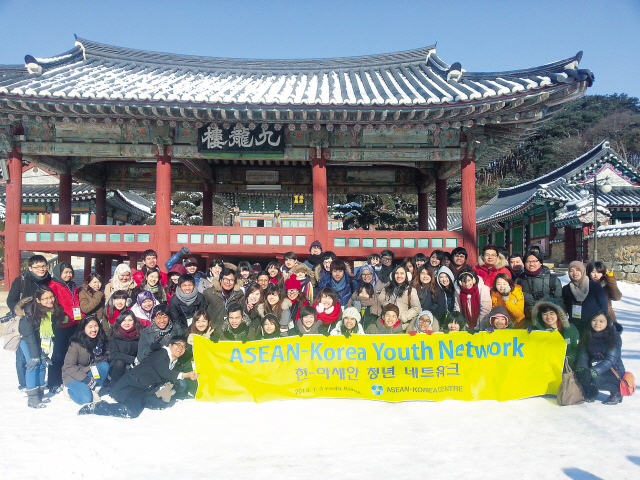ASEAN-Korea Center chairman Chung Hae-moon hosted diplomats and young people representing Southeast Asia in a dinner reception that capped off a day-long cultural program for young people, Thursday.
About 75 young people from Korea and Southeast Asian countries participated in a day full of cultural activities that aimed at boosting people-to-people exchanges in Yeoju, Gyeonggi Province, home to Korea’s traditional culture and historical sites.
The day of cultural exchange was organized by ASEAN-Korea Center as part of its “ASEAN-Korea Youth Network Program” to deepen mutual understanding and give young people from Southeast Asia and Korea a firsthand cultural experience.
 |
Some 75 young people from Korea and Southeast Asia gather for a group photo during the day-long ASEAN-Korea Youth Network Program in Yeoju, Gyeonggi Province, Thursday. (ASEAN-Korea Center) |
A slew of diplomats from Southeast Asia also participated in the reception, including Amalina Bakar, 2nd secretary at the Bruneian Embassy; Yiv Sokhim, commercial counselor at the Cambodian Embassy; Phanephantavanh Sayachack, 3rd secretary at the Laotian Embassy; Siti Fatma Omar, from the Malaysian Embassy; Wai Zin Tun, 1st secretary at the Burmese Embassy; Eugene Ng, 1st secretary at the Singaporean Embassy; Dang Quoc Binh, 2nd secretary at the Vietnamese Embassy; and Kanokporn Kuankid, 1st secretary at the Thai Embassy.
The Southeast Asian young people that participated in the program are students studying at universities across Korea, including far flung rural areas in provinces far from Seoul.
They visited historical sites in the Yeoju area, such as the Royal Tomb and Museum of King Sejong; the birth place of Empress Myeongseong and Silleuksa Temple.
They also learned about ginseng, how to make kimchi and traditional crafts like pottery-making.
“The underlying theme of the activities of the ASEAN-Korea Centre is the promotion of people-to-people exchanges. Programs such as this are an important way for the center to meet the mandate set by the government when the center was first established in 2009,” Chung said.
“We are giving youngsters an opportunity for meeting each other, communicating and networking. This is the beginning of more frequent and larger programs,” he said.
ASEAN has emerged as a major player in East Asia, which itself is becoming a big player on the global stage. Chung said this means people-to-people exchange and networking between future Southeast Asian leaders and Korea is more important than ever.
Organizers at the ASEAN-Korea Centre said they plan to expand programs that will enhance exchanges and networking between the future Korean and Southeast Asian leaders.
Established as an intergovernmental organization in March 2009, the ASEAN-Korea Centre helps increase trade and investment, and boost tourism and cultural exchanges between Korea and Southeast Asia.
By Philip Iglauer (
ephilip2011@heraldcorp.com)








